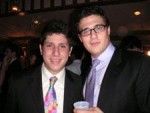Colgate’s Close-up

Earlier this month, you may have passed by a bright purple car parked behind Drake, ducked under boom microphones hanging over awnings downtown or caught sight of a camera crew filming in the parking lot of Delta Upsilon. Though you may have mistaken the commotion as the production for the new Broken Lizard film, this was no Puddle Cruiser.
Instead, the sets were in place for a project produced by a new kind of Colgate filmmaking team. Jacob Lindauer ’08 and Henry Prince ’07 co-wrote and produced and directed, respectively, a short independent film called Placebo, shot on the Colgate campus.
Lindauer and Prince, both Film minors at Colgate, started writing a feature film a year ago, finishing it this past June. After they had finished, they tried what Lindauer called “something wildly different”-writing a short film designed to seek exposure for their feature and for themselves.
“The goal of the short is to parlay that into larger opportunities. It’s basically a large résumé,” Lindauer said.
The résumé became Placebo, a comedy about a man who quits his job to sell drugs that are really over-the-counter medications. According to Lindauer, the movie is not as much about college as it is about questioning what makes something what it is.
“He doesn’t sell drugs, he sells the drug buying experience,” Lindauer said of the unnamed protagonist. In effect, Lindauer says, the movie asks: What makes a drug a drug? Is it that it gets you high or that it comes in a baggie?
As for filming in Hamilton, Prince and Lindauer were committed to keeping the setting a generic college campus. No scenes in Placebo include anything with the word Colgate, and there are no characters who wear Colgate clothing.
“But it’s such a beautiful campus,” said Lindauer. “If you know Colgate, you would obviously know [that the film is shot at] Colgate.”
The crew had to do considerable preparation before filming on campus, following the required protocol through the Office of the President. In turn, the university arranged for filming rights across campus, and for special privileges, such as turning on the lights on the athletic fields.
“The university was absolutely wonderful,” stressed Lindauer. “I don’t have enough good things to say about shooting here.”
Before filming, the production team also solicited student production assistants and extras in advertisements in The Maroon-News. Junior Lea Furutani became part of the 13-person crew who shot scenes with the actors and the twelve or so student extras.
“I basically helped out wherever they needed me, whether it was arranging the set, setting up reflectors for lighting, controlling the wires for the boom mic, doing makeup for the actors or taking set pictures,” Furuntani said. “I got a better sense of the collaborative efforts that go into making a movie. It was a valuable experience because I hope to become a filmmaker after graduating from Colgate.”
Now that filming has wrapped, the editing process begins. It will take at least a few months to edit Placebo down to its goal length of twelve to fourteen minutes. Then Lindauer and Prince will begin shopping their short film to festivals across the nation. While airing at Sundance would be ideal-a “pipe dream,” according to Lindauer-for practical purposes, they may go elsewhere.
“The real goal is to get our feature length film made, or another feature film made,” Lindauer said.






